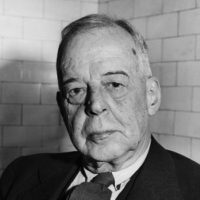
Alfred Richards
University of Pennsylvania
For organizing the Committee on Medical Research of the Office of Scientific Research and Development, and for supervising, during the war, the timely mass production of penicillin, the search for a better antimalarial drug, and the preparation of blood plasma.
From its inception in June 1941, Dr. Richards has been chairman of the Committee on Medical Research of the Office of Scientific Research and Development. In this capacity he wisely achieved administrative liaison between the Committee on Medical Research and the Division of Medical Sciences of the National Research Council, which led to the mobilization of American medical scientists for research on problems of importance to our armed forces. He early recognized the potential possibilities of penicillin at a time when large-scale commercial production seemed to be a vain hope. His faith in a successful outcome of commercial efforts in the face of many difficulties and repeated disappointments contributed in no small measure to the eventual prodigious production of penicillin achieved by the pharmaceutical industry. Dr. Richards gave the penicillin program his personal attention. Its success required proper timing during the period of limited supply of clinical evaluation of the drug, research on better methods of production, research on its chemistry, and priorities on its use in ways which would provide the greatest benefit to our armed forces without forgetting civilian needs. Through his long acquaintance with foreign scientists, he was able to bring about the closest collaboration between the medical scientists of Great Britain, Canada, Australia, and the United States.
As chairman of the Committee on Medical Research, Dr. Richards actively supported and encouraged comprehensive programs in the search for a better antimalarial drug, for protective measures against infectious diseases, for better insecticides and insect repellents, for improved methods of preparing blood and other solutions for transfusion, for increased knowledge of how to preserve man’s effectiveness in high and rapid flight, and many other problems of medical science which contributed so importantly to the prevention of disease, the preservation of physical fitness and the care of the sick and wounded.
His steadfastness of purpose, his adherence to high principles, and withal his understanding of and considerateness for others and their problems make Alfred Newton Richards affectionately admired by all medical scientists associated with him in the war effort. All men are in his debt.
